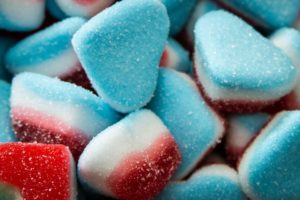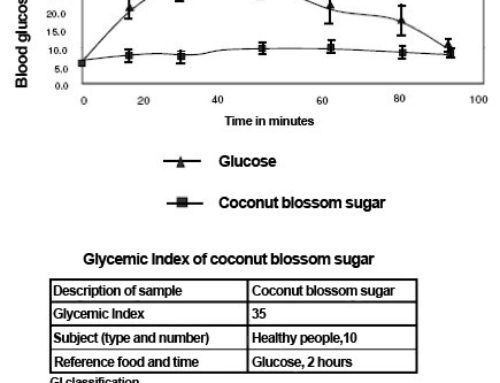Refined sugar: the bitter truth
Sugar is hot: from 10 million tons of cane and beet sugar in 1900 to 170 million tons in 2014
The last six months we couldn’t ignore it. In all kinds of articles, study, blogs, reports and such, scientists as well as the WHO (World Health Organization) reminded us of the dangers of added refined sugar. For instance, the average Western person consumed 50 kg in added refined sugar per year in 2014. In other words, approximately 15 % of his/her energy came from added refined sugar or in other words, he/she lived for more than a month a year on added refined sugars. Chemical sweeteners are not included in this. You may think “not me”. Nevertheless, you quickly reach 50 kg added sugar per year. You do not have to add a lot of extra sugar to your own dishes to consume this. Sugar after all became a cheap filler. These so-called “hidden sugars” in among others ketchup, canned foods, soups, processed and pre-packaged meats, prepared dishes, sauces and even baby food contribute no less than 80% of the added sugar we consume daily.
Is refined sugar the new tobacco?
But is the added sugar really as dangerous as we think? Is it just that the WHO reduced the standard in March 2014 and recommends that only 5% of our energy be gained from free (read: refined) sugar? American endocrinologist, Robert Lustig, fully agrees. “Society must treat added refined sugar as a drug, just like alcohol and tobacco”, says Lustig. What do all these scientists imply with sugar? When we speak about sugar, we are talking about the very sweet product from cane sugar or sugar beets, stripped from all its accompanying natural substances (nutrients). So sugar is the popular refined cane or beet sugar [Sugar and sweeteners, 2010]. The cheaper, even more refined HFCS, high fructose corn syrup, falls within the definition of sugar. Not only did history show that the emergence of refined cane and beet sugar was accompanied by the emergence of many new diseases, but doctors, WHO and the Centres of Disease Control and Prevention also see the relationship between the rise of these diseases and the excessive use of refined sugar. Despite the fact that our life expectancy has increased enormously in recent years, our quality of life certainly did not improve. Never before was there so much talk of allergy, intolerance, diabetes, obesity, fatigue, CVS, heart disease and ADHD.
So what about natural sugar? What about honey, maple syrup, agave syrup, coconut blossom sugar, etc.?
There are also healthy and unhealthy sugars in natural sweeteners (available in the bio-shop). Not all natural sugars or sweeteners are unrefined. In addition, there are natural sugars with a high and a low glycaemic index, sugars that contain more fructose and therefore are more stressful to the liver (thus stimulating the production of triglycerides), sugars that taste good and others that taste less good, sugars with and without additives, and so on. So what must we consider when choosing the best and tastiest natural sweetener?
Choose unrefined natural sweeteners
Refined sugar has more disadvantages than benefits. It is therefore best to choose unrefined sweeteners. Unrefined sweeteners contain other natural nutrients too, like vitamins, minerals and enzymes. Honey, coconut blossom sugar, maple syrup and agave syrup are sweeteners that are not refined and that are not chemically processed. Natural, organic sugars that are refined are not good for your health, such as refined cane sugar, rough cane sugar, brown cane sugar, white cane sugar, refined beet sugar, corn syrup, HFCS (High Fructose Corn Syrup), chicory syrup, maltose, galactose, xylose, maltodextrin, as well as all steviol-glycosides (refined stevia).
The importance of the glycaemic index, not only for diabetics
It is also best to choose a sweetener with a low glycaemic index. The glycaemic index is the measure used to determine whether or not the blood sugar level increased after you have eaten. The glycaemic index is expressed in a figure with glucose as reference. Glucose has a glycaemic index of 100. Foodstuffs with a low glycaemic index doesn’t cause spikes or drops in the blood sugar level (or no hypo and hyper glycaemia), release their energy constantly and slower, doesn’t affect the pancreas as much, therefore less insulin is released and less body fats (weight increase and obesity) and blood fats (cholesterol and triglycerides) are formed. So choose sweeteners with a low glycaemic index, certainly with diabetes and obesity. Natural sweeteners with a low glycaemic index (
Natural unrefined sweeteners: Maple syrup, agave syrup, honey and coconut blossom sugar: A summary
| Name | Origin | GI | Refined | sucrose / fructose / glucose | remarks | dosage relative to common sugar |
| Maple syrup | Thickened, sweet juice of the maple tree | 54 | No | ≥90% sucrose | Grade c contains the most minerals | 30 – 50% |
| Agavesiroop | Thickened juice of the Agave Americana | 40 | No | ≥90% fructose | Liver damage, increased cholesterol and triglyceride content | 30 – 50% |
| rauwe honing-koud-geslingerd, zonder toegevoegde suikers | Made by bees from blossom nectar | 48 | No | 45% fructose, 38% glucose | Commercial honey often has a higher glycaemic index | 50 – 65% |
| Gula Java Coconutblossom sugar | Thickened nectar of the coconut flower | 35 | No | 80 – 85% sucrose |
Very rich in antioxidants | 100% |
All figures in the table above are approximate and may vary as it concerns natural products
Mother Nature’s healthy sweetness: no refined sugars fresh fruit, honey, coconut blossom sugar, maple syrup (and agave syrup)
We are heading in the right direction, because we are informed of the dangers of refined sugar through all kinds of channels. Luckily, Mother Nature has provided us with some healthy, natural sweeteners. Do you feel like something sweet? Choose a healthy and delicious, unrefined sweetener with a low glycaemic index. The healthiest sweeteners therefore are fresh fruit, cold-pressed honey (untreated and unfiltered, containing no added sugars) and Gula Java coconut blossom sugar (very rich in antioxidants). Use fruit, honey or Gula Java coconut blossom sugar, maple syrup (and agave syrup) for both cold and hot dishes and beverages (in yoghurt, tea, coffee, pastries, smoothies, on pancakes, etc.). Coconut blossom sugar and honey are the only sweeteners that contain all the benefits: They are 100% natural, very rich in minerals and vitamins and extracted from blossoms. Perhaps that’s why they are so healthy.
Conclusion: refined sugars are regarded as cigarettes. They should carry the same warning on the package
The use of refined sugars in the Western world is far too high. To adapt to the new standard of the World Health Organization, we would have to cut the use of refined sugars by two-thirds. And we can certainly use some help with that. Robert Lustig proposes combining a sugar tax with subsidies for healthy food. In other words, treat added refined sugar like tobacco. A tax on refined sugar would be a nice solution, but whether that is realistic (with lobbying in mind), remains to be seen. Until then, it is important that we take responsibility ourselves and avoid refined sugars, opting for fresh fruit, natural honey and coconut blossom sugar. Maple syrup and to a lesser extent agave syrup can also be used. Our bodies will appreciate it.




